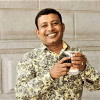An interview with Dr. Nuzhat Tam-Zaman, Co-Founder, Sinoveda Canada Inc.

This April, we celebrate a Bangladeshi woman, who is inspiring future generations of pharmacists and female leaders. Born in Bangladesh, her journey was packed with a lot of obstacles and yet, she fought against them all to pursue her dreams and passion to study an unconventional subject such as Chinese herbal medicine.
With Bachelor's and Master's degrees in pharmacy with distinction, Tam-Zaman is no stranger to hard work and perseverance. Today, she actively assists partners to register SinoVeda's products in foreign jurisdictions, including the first registration of Gingko and Ginseng as pharmaceutical products in Bangladesh.
Her success is not limited to the entrepreneurial world, as Tam–Zaman succeeds in academia with a wide number of scholarships from the Dhaka University Scholarship (1980-1988); Canadian Commonwealth Scholarship (1989-1994); Marie Louise Imrie Award (1993); to the Graduate Research Trainee Award (1995).
We had a pleasant conversation with Professor Nuzhat Tam-Zaman to find out more about her work.
How has your journey been so far?
I always wanted to be a physician but my immediate elder sister redirected me towards the faculty of pharmacy, which was fresh and booming back in the '80s. This worked better for me since I excelled throughout and finished First-Class-First in Master's. After this, the struggle was a bit uphill because I wanted to go abroad and could not ask my retired parents for funding. The only other way was to get a scholarship and luckily, I got that as well – the very prestigious Commonwealth scholarship!
Finally, I chose to go to Canada, but by then, I was already married and mother to a 15-months-old beautiful baby girl.
My then-husband did not see himself as a part of my vision and so we separated. This meant I had to start a brand-new life in a new destination all on my own, taking care of a little baby while studying for my PhD.
Every year, my family back at home would expect me to get homesick and return but I proved them wrong and persisted. I kept on trying hard because my vision was extremely clear to me and no matter what sort of obstacles came my way, I knew I had to overcome all of them to reach the endpoint.
All because my vision to become a pharma scientist, was a sure escape to a new world of freedom.
What do you think of the efficacy of Chinese herbal medicines and its competence in comparison to Western allopathic medicine?
Due to my field of study, I had the opportunity to learn about synthetic drugs comprehensively. Additionally, during Master's, I chose to study the efficacies of medicinal plants as a core subject matter. This gave me a clear viewpoint from both the sciences.
Plus, all of us already know that Ayurveda and Chinese herbal medicine have a long history that goes back more than thousands of years. Even our grandparents opted for medicinal plants such as tulsi pata and holud for a lot of health-related solutions. The efficacies were always known but the dosage was never standardised and hence, the doctors could not recommend the products to their patients.
This is where me and my current husband, who is also a native Chinese, decided to bridge the gap by discovering the bio-actives in Chinese herbal medicine and standardise the products for mass usage.
Together, we have tried to bring forward the efficacies of Chinese medicine to the world with the help of Western precision.
Where does Bangladesh stand currently in terms of standardising Chinese medicinal plants and recommending them to patients for health solutions?
I have always wanted to give back to Bangladesh and it was always in my plan to somehow connect my successes to the motherland. In Canada, 14 of Sinoveda's products got approval. So, I came back to Bangladesh and began working with Radiant Pharmaceuticals, who were the first in the country to introduce Ginseng and Ginko Biloba as medicinal products.
Having said that, I want to also point out that Bangladesh is currently enjoying the rules of Intellectual Property Rights, but once it graduates to the middle-income status, the rights will no longer be there. Patented products will be hard to avail and so, the country needs to be more proactive in this sector. It is about time to venture into Chinese medicinal sciences, build safe and productive medicines, with appropriate clinical trials, and get US FDA approval as soon as possible. This will definitely put Bangladesh in an advantageous position.
Sinoveda products got selected for the Oscars gift bag. How do you feel?
Every year, different companies get selected for their products. This year, we got selected as a part of the gift pack, it was a great feeling to be included in one of Hollywood's biggest nights.
Your final words for the women of Bangladesh…
We must always remember that obstacles will always be there and that success in life 'cannot – will not' come, if we do not have the courage to face the failure.
There would be people from all aspects of life discouraging us but the vision needs to be clear in your heads. We have to be able to see the horizon on our own, and the solutions will automatically emerge as we progress.
Finally, always remember to magnify the vision, the obstacles would eventually fade out.

 For all latest news, follow The Daily Star's Google News channel.
For all latest news, follow The Daily Star's Google News channel. 








Comments